- Home
- Franklin W. Dixon
Mystery of the Flying Express
Mystery of the Flying Express Read online
Table of Contents
Title Page
Copyright Page
CHAPTER I - Stargazer
CHAPTER II - First Warning
CHAPTER III - Hot Merchandise
CHAPTER IV - A Near Miss
CHAPTER V - The Mysterious Artist
CHAPTER VI - Collision Course!
CHAPTER VII - Diver’s Peril
CHAPTER VIII - An Unheeded Horoscope
CHAPTER IX - A Buddy Lost
CHAPTER X - Beware of the Claw!
CHAPTER XI - An Unequal Match
CHAPTER XII - Baiting a Trap
CHAPTER XIII - Disappearing Act
CHAPTER XIV - Anchors Aweigh!
CHAPTER XV - Under the Bed!
CHAPTER XVI - Clever Clues
CHAPTER XVII - Zodiac Zig
CHAPTER XVIII - A Growing Suspicion
CHAPTER XIX - Key to a Capture
CHAPTER XX - End of the Road
MYSTERY OF THE FLYING EXPRESS
A sleek new hydrofoil is scheduled to start ferrying passengers between Bayport and Cape Cutlass. But business enemies of the hydrofoil owner have stirred up a hornets’ nest of violent opposition among small boat owners. Fearing sabotage, he begs Frank and Joe Hardy to guard the Flying Express on her maiden trip.
Startling developments plunge the teen-age detectives into a dangerous chase by sea, air, and land in pursuit of a gang of hardened criminals who operate by the signs of the Zodiac. The Hardys’ close pal Chet Morton tries to help them by using his newly acquired knowledge of astrology.
Tension mounts when the Flying Express vanishes-and so does Sam Radley, Mr. Hardy’s skilled operative. Has Radley been kidnapped? Is he a prisoner aboard the stolen hydrofoil? Peril stalks Frank and Joe’s every move as they hunt down the terrifying gangleader Zodiac Zig and his vicious henchmen.
The hydrofoil plowed into the boat amidships!
Copyright © 1977, 1968, 1941 by Simon & Schuster, Inc. All rights reserved.
Published by Grosset & Dunlap, Inc., a member of The Putnam & Grosset
Group, New York. Published simultaneously in Canada. S.A.
THE HARDY BOYS® is a registered trademark of Simon & Schuster, Inc.
GROSSET & DUNLAP is a trademark of Grosset & Dunlap, Inc.
Library Of Congress Catalog Card Number: 73-106327
eISBN : 978-1-101-07634-7
2007 Printing
http://us.penguingroup.com
CHAPTER I
Stargazer
LOUD explosions, like a fusillade of gunfire, echoed through the quiet streets of Bayport. An old jalopy careened around the corner. The driver, plump and freckle-faced, pulled up before the home of Fenton Hardy, private detective.
Frank Hardy, eighteen years old, and his brother Joe, a year younger, guessed who was coming before they spotted their visitor.
“Chet Morton, for sure,” said blond-haired Joe, looking out a window. “And is he excited!”
Chet waved and beckoned. “Hey, fellows! Big doings at the waterfront! Let’s go!” he called out as the Hardy boys bounded down the front steps.
“What is it all about?” asked dark-haired Frank.
“Hop in and I’ll explain on the way.”
The three crowded into the front seat. Chet started the car, which lurched away from the curb, jouncing its passengers as it picked up speed and headed for Bayport Harbor.
Joe braced himself with a hand against the dashboard. “Okay, we’re on our way. You’d better clue us in before this ancient heap decides to pause for a rest!”
Chet chuckled. “Sir, you are referring to the vehicle I love, but I’ll overlook the remark in view of the circumstances! Seriously, though, there’s real trouble down there. Something to do with the big hydrofoil.”
Joe looked surprised. “The Flying Express? I thought she was all set for her maiden spin the day after tomorrow.”
Chet shifted gears as he turned onto Bayport’s main street. “Right. She’s scheduled to begin her new commuter service to Providence. Wish I had a ticket, but they’re all sold out.”
Providence was a port at the tip of Cape Cutlass, seventy miles south of Bayport. The three youths often spun down there and back aboard the Hardys’ motorboat, the Sleuth.
“What’s wrong with the Flying Express?” Frank wanted to know. “Mechanical failure?”
“Not the way I understand it,” Chet replied. “Something to do with public relations. Seems that quite a few people would like to foil the hydrofoill”
“Owl” Joe said. “Pretty corny pun.”
Chet stopped at a red light near Condor’s Photo Store. “Hey, Frank, let’s pick up the passport pictures while we’re here,” Joe suggested.
“Good idea. Chet, pull over for a minute, will you?”
Fenton Hardy and his operative Sam Radley had had their photos taken to renew their passports, which were always kept up to date. Chet parked in front of the shop and the Hardys hastened inside. Frank took Sam’s pictures, while Joe pocketed his father’s. They paid the photographer and soon were off again for the waterfront.
As they approached the dock where the Flying Express was berthed they could hear the tumult of the crowd gathered there. Small boat owners milled around, shouting and gesturing at the shiny white fiberglass vessel riding low in the water. Chet parked the car nearby and they all got out.
The ship’s sleek hull had enclosed cabins forward and aft, and a rakish pilot’s bridge. The windshields of the wheelhouse looked out over a metal deck. This forward deck obviously was not for passengers. The rear deck was slightly lower and guarded by white pipe railing.
“Quite a boat,” Frank said admiringly.
“She’s a hundred feet long and has accommodations for sixty passengers,” Chet explained, “with a top speed of seventy miles an hour.”
“I wonder what they have against a beauty like that,” Joe said, pointing toward a picket line carrying placards. In bold lettering one sign read:
STOP THE FLYING EXPRESS
MAKE BARMET BAY SAFE
“Beats me,” Frank replied. “I can’t see that she’ll get in anybody’s way as long as she slows down when she enters the harbor. Barmet Bay’s big enough for everybody.”
Chet had been inspecting the rest of the crowd. “Those kids near the slip are painting signs. I think I’ll mosey over for a closer look at their artistic productions—Hey, what’s this?”
One of the sign painters suddenly pushed a placard into his hand. Frank and Joe received the same treatment from a couple of paint-smeared teen-agers. Before they realized it, the Hardys and Chet were holding slogans of protest against the hydrofoil.
“Say, we have nothing to do with you guys!” Chet shouted angrily.
“Watch it!” Joe warned. “Here comes a TV news truck! Let’s get out of here!”
Hurriedly the boys threw down the placards. But it was too late! The truck had swept past, its lens pointing directly at them!
“Holy catfish! They got us!” Joe groaned.
Some of the pickets were yelling for a raid on the Flying Express. “Scuttle the hydrofoil!” one of them shouted. The rest took up the chant: “Scuttle the hydrofoil! Scuttle the hydrofoil!”
They were about to go into action when a police car rolled into the middle of the mob. Bayport’s chief of police got out and surveyed the disorder.
“We’ve got a complaint about this dock being blocked illegally,” Chief Collig boomed through a bullhorn. “I want some explanations. Let’s start with you two fellows- Well, if it isn’t Frank and Joe Hardy! How did you get involved?”
Chief Collig knew the Hardy boys well because they frequently helped their father
with his detective cases. Their ability as amateur sleuths was known to practically everyone in Bayport, and they cooperated with the police whenever they could.
While Frank spoke to the chief, Chet slipped away to a group of sign painters, and began work ing with a brush and a piece of cardboard.
“Some pal, leaving us to face the music,” Joe thought.
“We’re not in this fracas, Chief!” Frank said. “We’re the most innocent bystanders you ever saw.”
A middle-aged woman rushed forward brandishing a finger at the Hardys. “Innocent my foot. I saw them! They were right in the middle of it.”
Chet, carrying a sign behind his back, edged his way into the group around Frank and Joe.
The woman was running out of breath. She finished by pointing to a placard on the ground, and declared triumphantly, “There, that’s one of the signs they were carrying! Look for yourself.”
“I’ll get it,” Chet said quickly. Stooping, he deftly switched placards and straightened up with the one he had been carrying. He pushed it into Frank’s hand, and raised the boy’s elbow so that everybody could read the words he had painted:
FRANK HARDY FOR MAYOR
A roar of laughter came from the crowd. Even Chief Collig showed the trace of a smile.
Frank glanced at the sign and winked at Chet.
By now the ugly mood of the protestors was evaporating. They began to drift away from the dock. Seeing that everything was under control, Chief Collig drove back to headquarters.
Frank, Joe, and Chet returned to the Hardy home. They were met at the door by the boys’ Aunt Gertrude, Fenton Hardy’s sister, who had come to live with the family some time ago. She was tall, angular, and had a no-nonsense look behind her spectacles. Although Aunt Gertrude scolded the boys for taking what she considered too many risks, she held her nephews in deepest affection.
“I hear there has been trouble at the waterfront,” she said sternly. “No doubt you were there!”
A roar of laughter came from the crowd
“Of course we were, Aunty.” Joe grinned. “But we spent most of our time with Chief Collig—on the right side of the law!”
Chet rolled his eyes at Aunt Gertrude. “How’s the food situation today? You wouldn’t happen to have any of my favorite pies in the house, would you?”
“Maybe I would, Chet. Come on into the kitchen!”
While she put big slices of rhubarb-and-strawberry pie on three plates, Frank took milk from the refrigerator. Then the trio carried their refreshments into the living room.
“You know,” Chet remarked between mouth fuls, “I still don’t know how a hydrofoil works.”
“At slow speeds, it floats on the surface like a boat,” Frank explained. “When the pilot revs up the motor, the hull rises clear of the water and skims along like a low flying aircraft. Neat invention, made by Enrico Forlanini in 1906.”
“You mean it actually takes off?” Chet asked.
“No. It never loses contact with the water because it stands on struts attached to submerged foils. They are shaped like wings to give a balancing effect.”
“I think I get it.”
“You see, Chet,” Frank continued, “as speed increases, the water flowing over the rounded top of the foils travels faster than the water underneath. That causes less pressure above, and gives the hull the lift to get clear of the surface. Same principle as a plane in the air.”
Chet downed his last piece of pie. “What about propulsion?”
Joe took up the explanation. “The U. S. Navy has done a great deal of experimenting, using everything from gasoline to jet engines. The Flying Express happens to be diesel-powered. The motor turns the screw propellers at the stern. A hydrofoil provides a fast, smooth ride, and it doesn’t create much of a wake.”
“Exactly,” Frank pointed out. “So why should the small boat owners object to a hydrofoil on Barmet Bay? It’s not going to swamp them. Accidents will happen, but you can say that of anything that sails. Today’s protest was mystifying, to say the least.”
Joe sighed. “You said it. Anyhow, it’s too bad we won’t be aboard on her first trip. We had planned to take Callie and Iola, but went for tickets too late.”
Callie Shaw was Frank’s favorite date, and Joe enjoyed being with Chet’s sister Iola.
Chet put his glass down with a clank. “Jumping Gemini! I could have told you to save your time and energy. You and Callie are both Aries. Your horoscopes indicate that bad news is all you can expect right now since you were born under the sign of the Raml”
Frank and Joe exchanged knowing smiles. Chet was always involved in some new hobby. Just now it was astrology—casting horoscopes to discover the influence that the stars and planets are supposed to have upon a person’s life.
“So you’re reading Joe’s fate in the stars?” Frank joshed.
“Don’t laugh.” Chet spoke with an owlish air of solemnity. “You’re Scorpio. The sign of the Scorpion. The planets aren’t in the right conjunction for you this month either!”
“Do you really believe all that?”
“Sure I do. What was good enough for the ancient Egyptians is good enough for me.”
Chet adopted the tone of a professor lecturing to rather dimwitted students. It was a pose he enjoyed. “Listen carefully. A Scorpion likes to think things out, taking into account all the factors of a problem. He’s good at analyzing clues and motives. He’s a born leader. That’s you, Frank.”
Chet cleared his throat and went on, “An Arian is more of an activist. He dashes into all kinds of situations without worrying too much about consequences. He’s full of enthusiasm and good humor. That’s you, Joe. Makes sense, doesn’t it?”
The Hardys agreed that it did. On many of their cases, Frank tended to be the leader because he could figure out the logical steps to take. Joe, on the other hand, was impetuous and refused to admit anything was impossible.
“Still,” Frank mused, “there are times when I’m more impulsive and—”
“Hey. Looks as if we’re getting company,” Joe interrupted his brother.
The other two boys joined Joe at the window. A man stopped and looked at the Hardy house. He strode past, turned around, paused, and squinted at the number again. Then he approached the front door.
“Here comes more bad news!” Chet quavered.
CHAPTER II
First Warning
THE bell rang. Joe headed for the door and admitted the stranger.
“I’m looking for Frank and Joe Hardy,” the man said.
“I’m Joe. Come on inside.”
Joe escorted the visitor into the living room and introduced Frank and Chet. The man seemed a bit jumpy, as if his nerves were on edge. He shifted his weight from one foot to the other, and twisted the brim of his felt hat between his fingers.
“My name is Spencer Given,” he began. “I’m here because I want you boys to ride on the Flying Express for a few runs, starting the day after tomorrow!”
Frank and Joe stared at each other in surprise. “Are you kidding?” Frank said. “We tried to get tickets days ago. They’re all sold out!”
“Don’t joke,” Given replied. “I happen to own the hydrofoil. And I’d like to hire you as detectives!”
Frank raised his eyebrows. “You expect trouble?”
“Well, the small boat owners of Bayport, the railroad, and the bus companies all resent the competition. That’s why they spread the rumor that the Flying Express wasn’t safe and that was the reason for the demonstration down at the dock today.”
Frank nodded. “We know.”
“Completely unfair!” Given exploded wrathfully. “Boats on Barmet Bay won’t be in any danger from my craft. And I won’t be taking any substantial number of patrons away from the trains and buses. Yet they won’t listen. They’re determined to drive me off the run to Cape Cutlass.”
The boys listened with growing interest.
“I don’t believe they’d stop at anything,” Giv
en continued. “What’s got me worried is the possibility of sabotage—those foils and propellers are vulnerable.
“That’s why I want you on board. You could circulate among the passengers and keep your eyes open. If you spotted anyone up to mischief, you could blow the whistle on him.”
Frank pinched his lower lip. “I don’t know,” he said doubtfully. “Since you’re looking for a detective, why didn’t you contact my father? Dad’s an old master at sabotage cases.”
“Fenton Hardy would be ideal,” Given admitted, “but he’s too high-priced for this assignment. Amateurs should be able to handle it. I want you two fellows because I’ve checked your records. You’re pretty good detectives who’ve cracked quite a few cases.”
The boys’ accomplishments in crime detection were almost as well known as those of their famous father. Their first success was solving the mystery of The Tower Treasure, and their recent adventure was known as The Disappearing Floor.
Frank turned to his brother. “What do you think, Joe?”
“I’m all for it,” Joe declared enthusiastically. He turned to Chet. “Want to give us a hand?”
Chet looked doubtful. “This—er—saboteur won’t be able to blow up the boat or something drastic like that, will he?”
Frank chuckled. “That’s what we’re hired for. To prevent any funny business he might have in mind. Well, Chet, you want to come or not?”
“Sure, sure. Somebody’s got to look after you!”
“Another point,” Joe put in. “Our girl friends would never forgive us if we traveled to Cape Cutlass without them. Do you think you could get us a couple of extra tickets, Mr. Given?”
Given wagged his head approvingly. “That’s not a bad idea! With your girls along no one will suspect that you’re there for any other purpose than the joy-ride. But I don’t want you to pay all your attention to the girls, now. Remember, you’ve got a job to do!”
“Don’t worry,” Frank said. “We’ll be on the ball.”
Given sighed in relief and extended a hand. “It’s a deal.”
Just then footsteps were heard on the stairs and Aunt Gertrude bustled into the living room. When she saw Given, she stopped short.

 The Great Pumpkin Smash
The Great Pumpkin Smash Who Let the Frogs Out?
Who Let the Frogs Out? Return to Black Bear Mountain
Return to Black Bear Mountain A Treacherous Tide
A Treacherous Tide Bug-Napped
Bug-Napped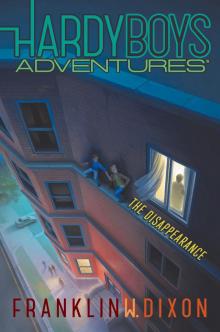 The Disappearance
The Disappearance Sea Life Secrets
Sea Life Secrets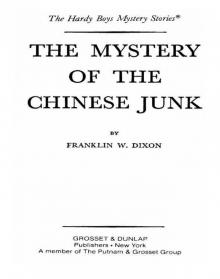 The Mystery of the Chinese Junk
The Mystery of the Chinese Junk A Skateboard Cat-astrophe
A Skateboard Cat-astrophe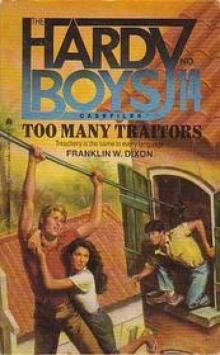 Too Many Traitors
Too Many Traitors Galaxy X
Galaxy X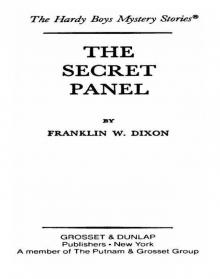 The Secret Panel
The Secret Panel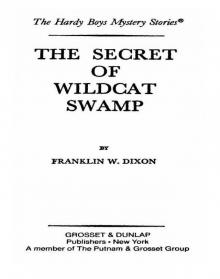 The Secret of Wildcat Swamp
The Secret of Wildcat Swamp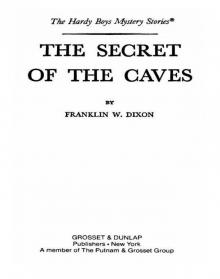 The Secret of the Caves
The Secret of the Caves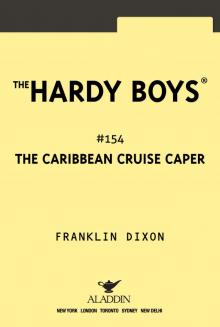 The Caribbean Cruise Caper
The Caribbean Cruise Caper Without a Trace
Without a Trace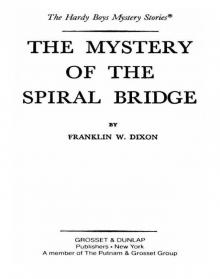 The Mystery of the Spiral Bridge
The Mystery of the Spiral Bridge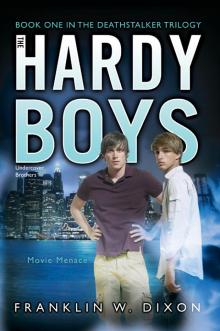 Movie Menace
Movie Menace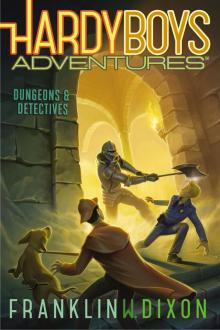 Dungeons & Detectives
Dungeons & Detectives Water-Ski Wipeout
Water-Ski Wipeout The Case of the Psychic's Vision
The Case of the Psychic's Vision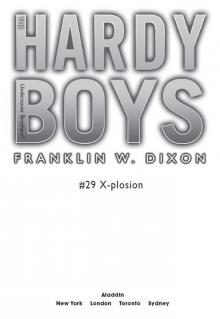 X-plosion
X-plosion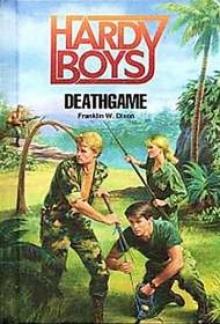 Deathgame
Deathgame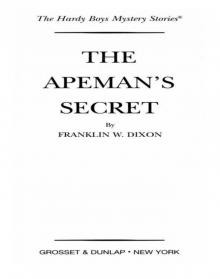 The Apeman's Secret
The Apeman's Secret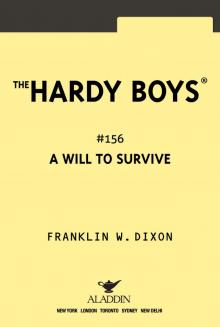 A Will to Survive
A Will to Survive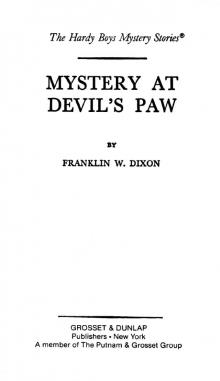 Mystery at Devil's Paw
Mystery at Devil's Paw Blood Money
Blood Money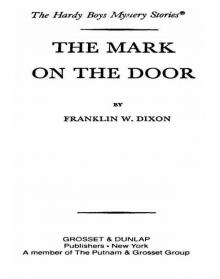 The Mark on the Door
The Mark on the Door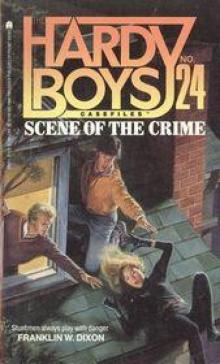 Scene of the Crime
Scene of the Crime The Gray Hunter's Revenge
The Gray Hunter's Revenge Stolen Identity
Stolen Identity The Mummy's Curse
The Mummy's Curse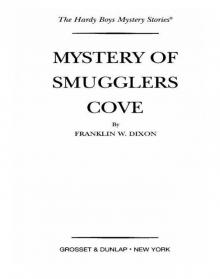 Mystery of Smugglers Cove
Mystery of Smugglers Cove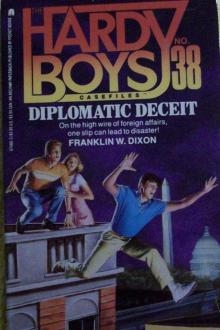 Diplomatic Deceit
Diplomatic Deceit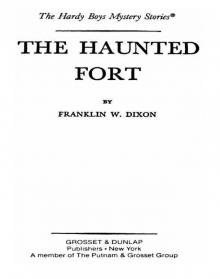 The Haunted Fort
The Haunted Fort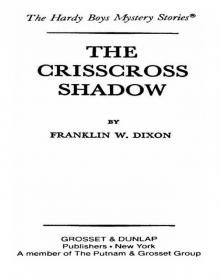 The Crisscross Shadow
The Crisscross Shadow Secret of the Red Arrow
Secret of the Red Arrow Trial and Terror
Trial and Terror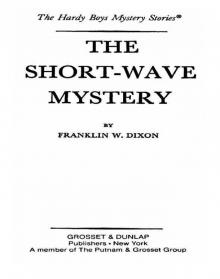 The Short-Wave Mystery
The Short-Wave Mystery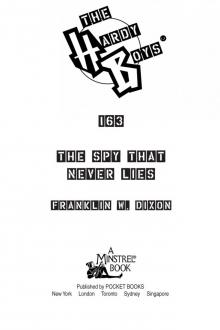 The Spy That Never Lies
The Spy That Never Lies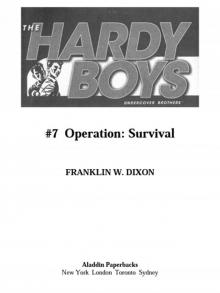 Operation: Survival
Operation: Survival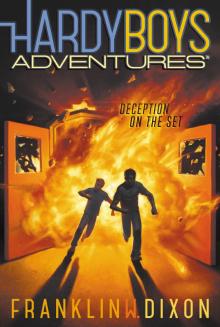 Deception on the Set
Deception on the Set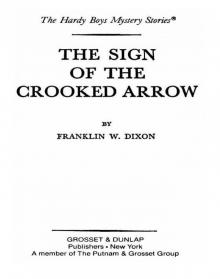 The Sign of the Crooked Arrow
The Sign of the Crooked Arrow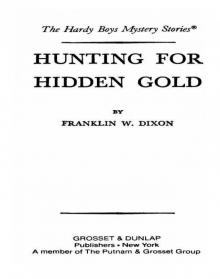 Hunting for Hidden Gold
Hunting for Hidden Gold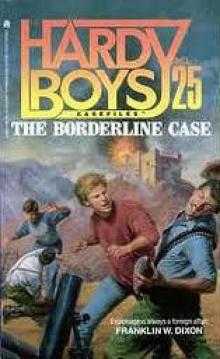 Disaster for Hire
Disaster for Hire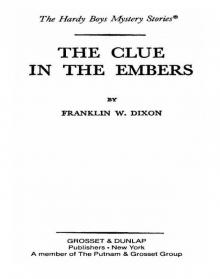 The Clue in the Embers
The Clue in the Embers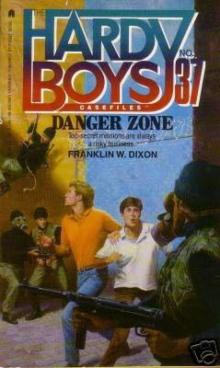 Danger Zone
Danger Zone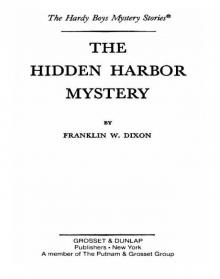 The Hidden Harbor Mystery
The Hidden Harbor Mystery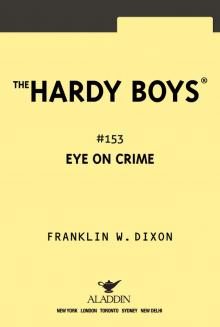 Eye on Crime
Eye on Crime A Game Called Chaos
A Game Called Chaos The Bicycle Thief
The Bicycle Thief The Missing Playbook
The Missing Playbook Survival Run
Survival Run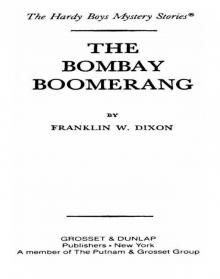 The Bombay Boomerang
The Bombay Boomerang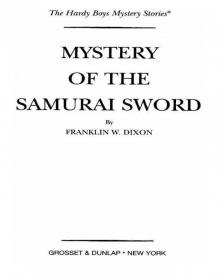 Mystery of the Samurai Sword
Mystery of the Samurai Sword Burned
Burned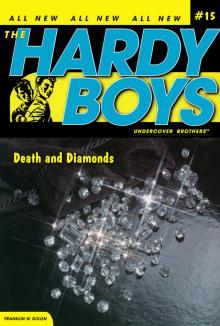 Death and Diamonds
Death and Diamonds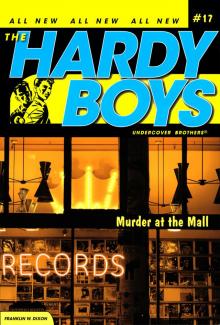 Murder at the Mall
Murder at the Mall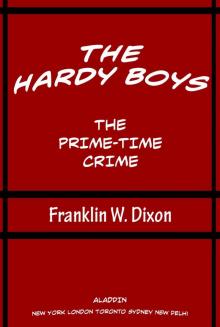 The Prime-Time Crime
The Prime-Time Crime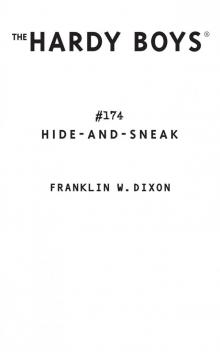 Hide-and-Sneak
Hide-and-Sneak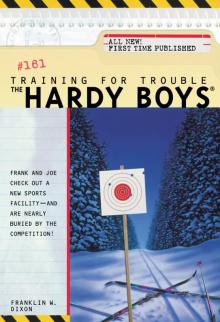 Training for Trouble
Training for Trouble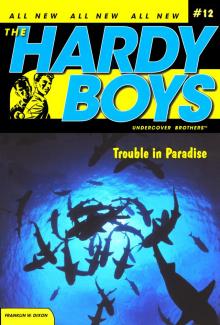 Trouble in Paradise
Trouble in Paradise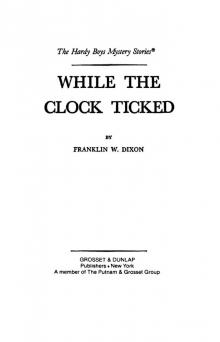 While the Clock Ticked
While the Clock Ticked The Alaskan Adventure
The Alaskan Adventure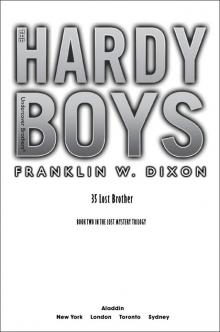 The Lost Brother
The Lost Brother Tunnel of Secrets
Tunnel of Secrets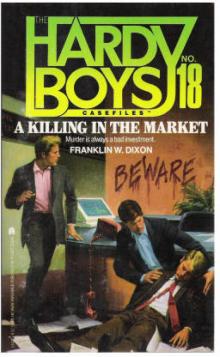 A Killing in the Market
A Killing in the Market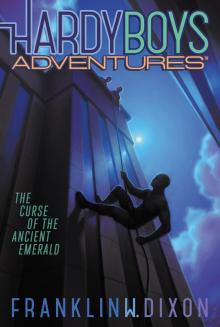 The Curse of the Ancient Emerald
The Curse of the Ancient Emerald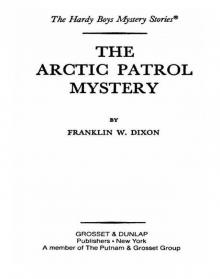 The Arctic Patrol Mystery
The Arctic Patrol Mystery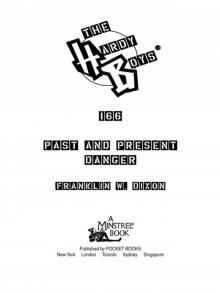 Past and Present Danger
Past and Present Danger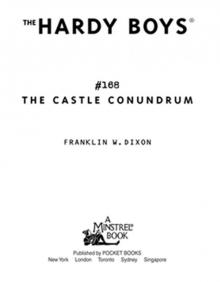 The Castle Conundrum (Hardy Boys)
The Castle Conundrum (Hardy Boys) Farming Fear
Farming Fear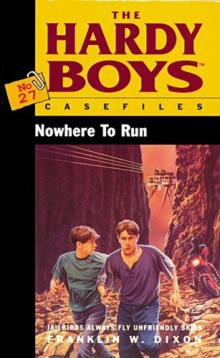 Nowhere to Run
Nowhere to Run The Secret of the Soldier's Gold
The Secret of the Soldier's Gold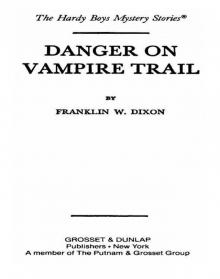 Danger on Vampire Trail
Danger on Vampire Trail The Lure of the Italian Treasure
The Lure of the Italian Treasure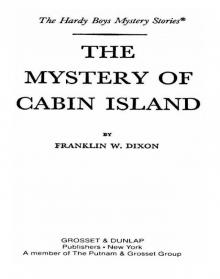 The Mystery of Cabin Island
The Mystery of Cabin Island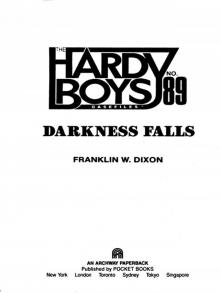 Darkness Falls
Darkness Falls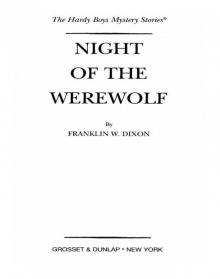 Night of the Werewolf
Night of the Werewolf Danger in the Extreme
Danger in the Extreme The Lazarus Plot
The Lazarus Plot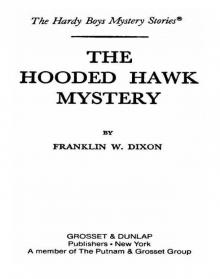 The Hooded Hawk Mystery
The Hooded Hawk Mystery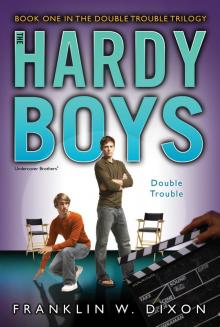 Double Trouble
Double Trouble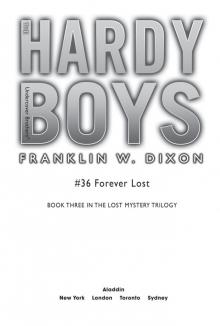 Forever Lost
Forever Lost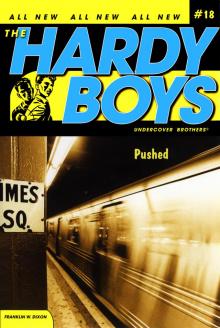 Pushed
Pushed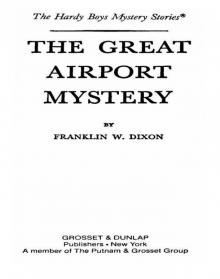 The Great Airport Mystery
The Great Airport Mystery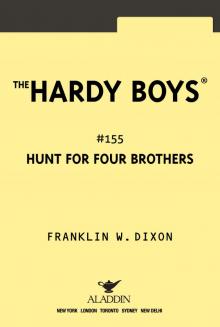 The Hunt for Four Brothers
The Hunt for Four Brothers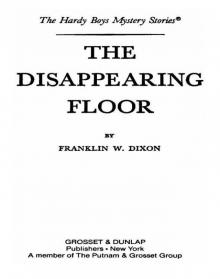 The Disappearing Floor
The Disappearing Floor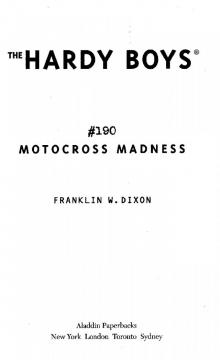 Motocross Madness
Motocross Madness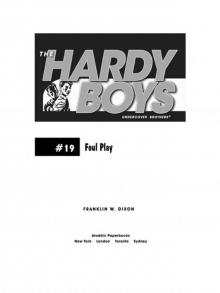 Foul Play
Foul Play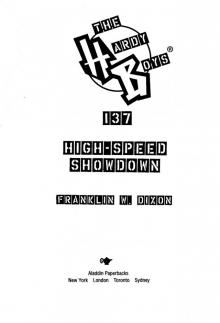 High-Speed Showdown
High-Speed Showdown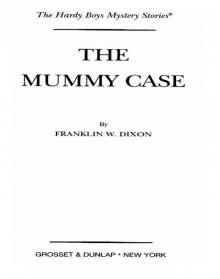 The Mummy Case
The Mummy Case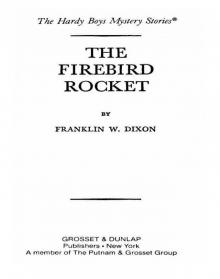 The Firebird Rocket
The Firebird Rocket Trouble in Warp Space
Trouble in Warp Space Ship of Secrets
Ship of Secrets Line of Fire
Line of Fire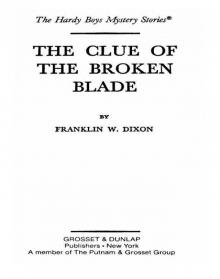 The Clue of the Broken Blade
The Clue of the Broken Blade Medieval Upheaval
Medieval Upheaval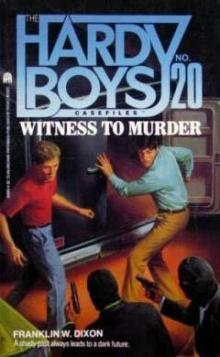 Witness to Murder
Witness to Murder The Giant Rat of Sumatra
The Giant Rat of Sumatra Attack of the Bayport Beast
Attack of the Bayport Beast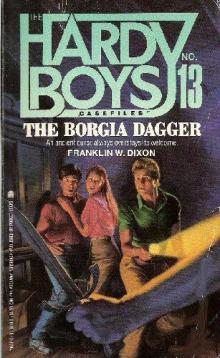 The Borgia Dagger
The Borgia Dagger Scavenger Hunt Heist
Scavenger Hunt Heist No Way Out
No Way Out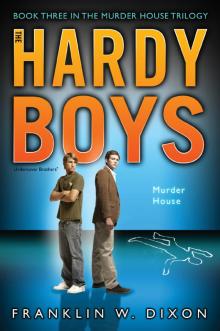 Murder House
Murder House The X-Factor
The X-Factor The Desert Thieves
The Desert Thieves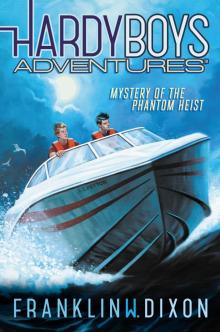 Mystery of the Phantom Heist
Mystery of the Phantom Heist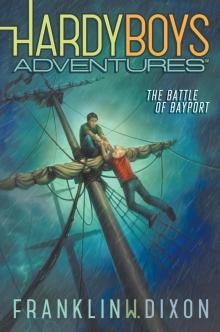 The Battle of Bayport
The Battle of Bayport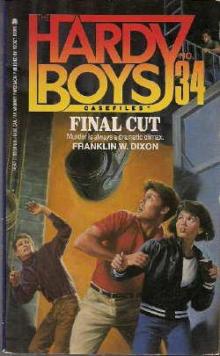 Final Cut
Final Cut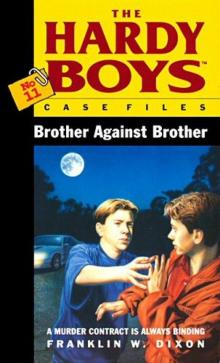 Brother Against Brother
Brother Against Brother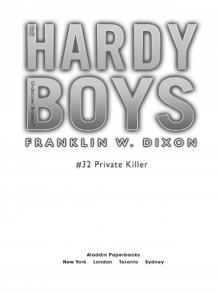 Private Killer
Private Killer The Mystery of the Black Rhino
The Mystery of the Black Rhino Feeding Frenzy
Feeding Frenzy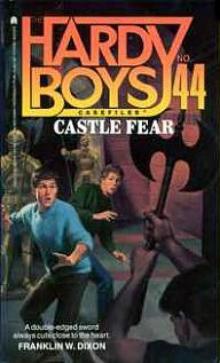 Castle Fear
Castle Fear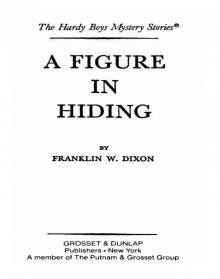 A Figure in Hiding
A Figure in Hiding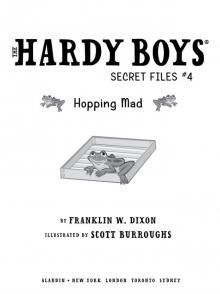 Hopping Mad
Hopping Mad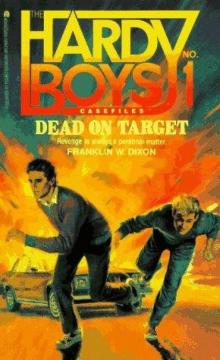 Dead on Target
Dead on Target Skin and Bones
Skin and Bones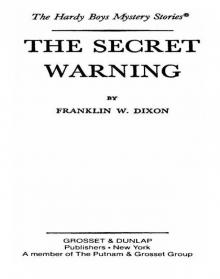 The Secret Warning
The Secret Warning Flesh and Blood
Flesh and Blood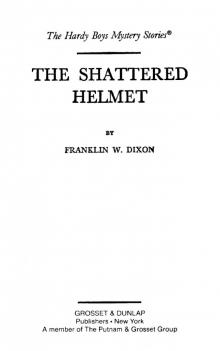 The Shattered Helmet
The Shattered Helmet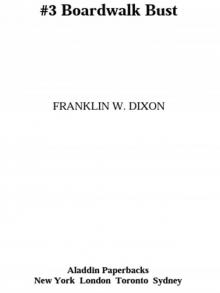 Boardwalk Bust
Boardwalk Bust Terror at High Tide
Terror at High Tide In Plane Sight
In Plane Sight The London Deception
The London Deception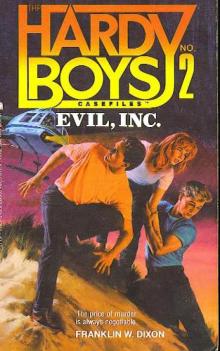 Evil, Inc.
Evil, Inc. Deprivation House
Deprivation House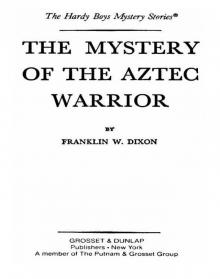 The Mystery of the Aztec Warrior
The Mystery of the Aztec Warrior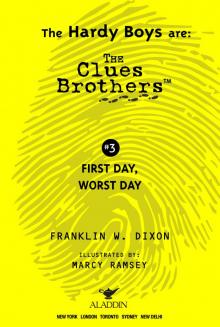 First Day, Worst Day
First Day, Worst Day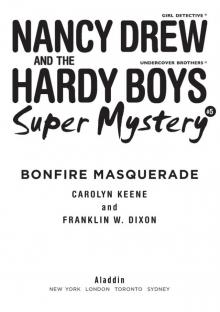 Bonfire Masquerade
Bonfire Masquerade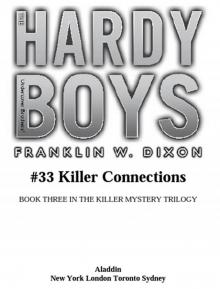 Killer Connections
Killer Connections Strategic Moves
Strategic Moves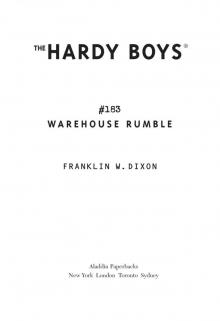 Warehouse Rumble
Warehouse Rumble The Chase for the Mystery Twister
The Chase for the Mystery Twister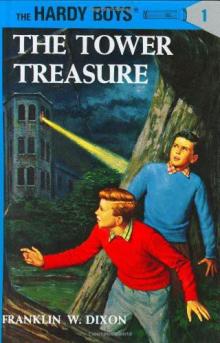 The Tower Treasure thb-1
The Tower Treasure thb-1 The Children of the Lost
The Children of the Lost The Last Laugh
The Last Laugh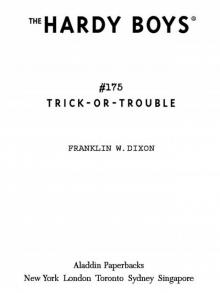 Trick-or-Trouble
Trick-or-Trouble Perfect Getaway
Perfect Getaway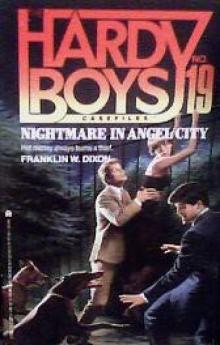 Nightmare in Angel City
Nightmare in Angel City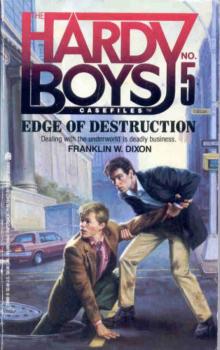 Edge of Destruction
Edge of Destruction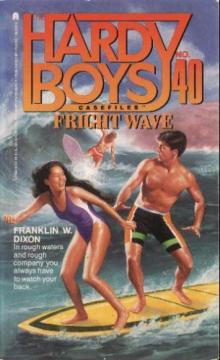 Fright Wave
Fright Wave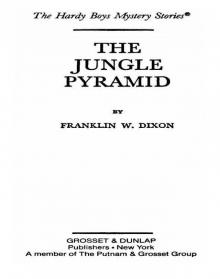 The Jungle Pyramid
The Jungle Pyramid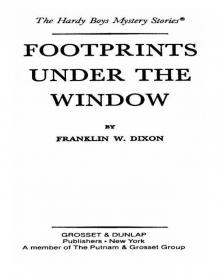 Footprints Under the Window
Footprints Under the Window The Gross Ghost Mystery
The Gross Ghost Mystery A Monster of a Mystery
A Monster of a Mystery House Arrest
House Arrest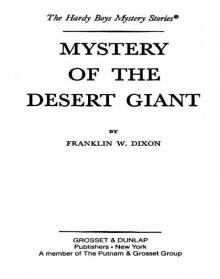 Mystery of the Desert Giant
Mystery of the Desert Giant Talent Show Tricks
Talent Show Tricks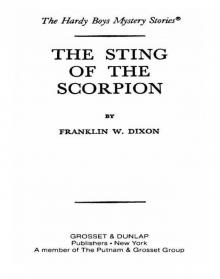 The Sting of the Scorpion
The Sting of the Scorpion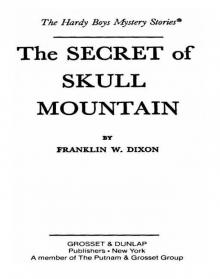 The Secret of Skull Mountain
The Secret of Skull Mountain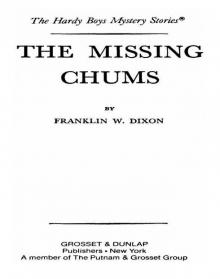 The Missing Chums
The Missing Chums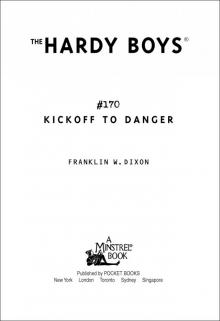 Kickoff to Danger
Kickoff to Danger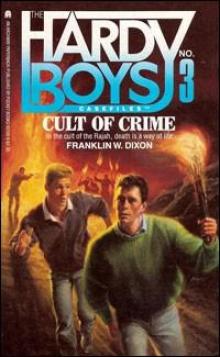 Cult of Crime
Cult of Crime Running on Fumes
Running on Fumes Martial Law
Martial Law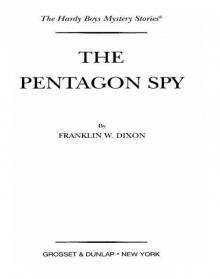 The Pentagon Spy
The Pentagon Spy Hazed
Hazed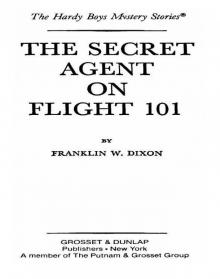 The Secret Agent on Flight 101
The Secret Agent on Flight 101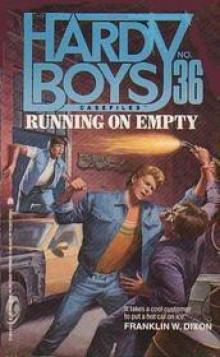 Running on Empty
Running on Empty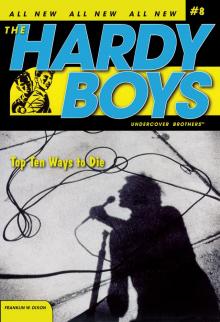 Top Ten Ways to Die
Top Ten Ways to Die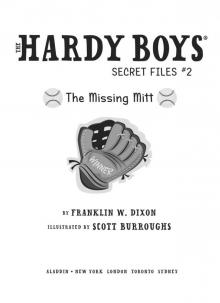 The Missing Mitt
The Missing Mitt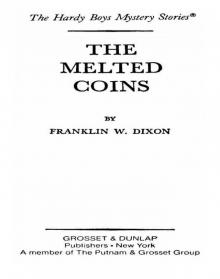 The Melted Coins
The Melted Coins The Rocky Road to Revenge
The Rocky Road to Revenge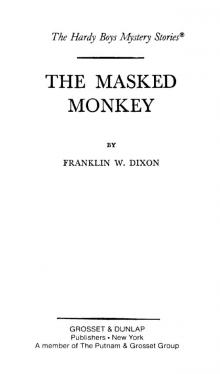 The Masked Monkey
The Masked Monkey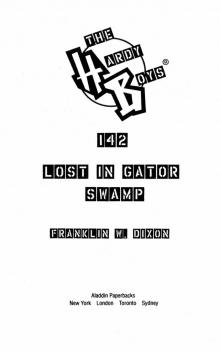 Lost in Gator Swamp
Lost in Gator Swamp Extreme Danger
Extreme Danger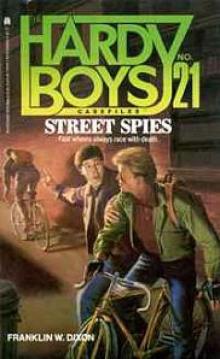 Street Spies
Street Spies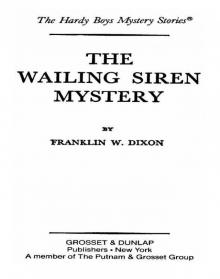 The Wailing Siren Mystery
The Wailing Siren Mystery The Dangerous Transmission
The Dangerous Transmission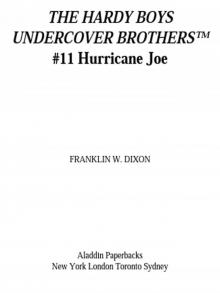 Hurricane Joe
Hurricane Joe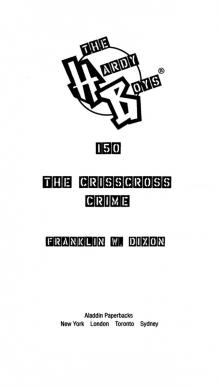 The Crisscross Crime
The Crisscross Crime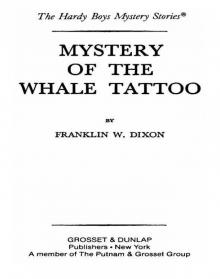 Mystery of the Whale Tattoo
Mystery of the Whale Tattoo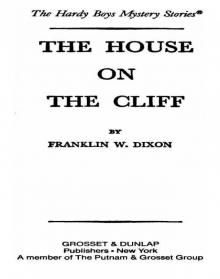 The House on the Cliff
The House on the Cliff Camping Chaos
Camping Chaos Ghost of a Chance
Ghost of a Chance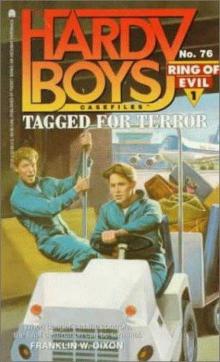 Tagged for Terror
Tagged for Terror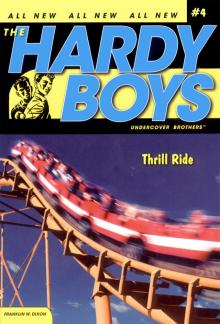 Thrill Ride
Thrill Ride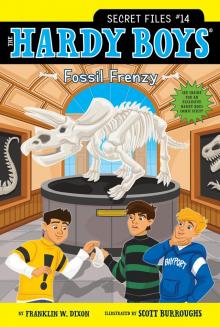 Fossil Frenzy
Fossil Frenzy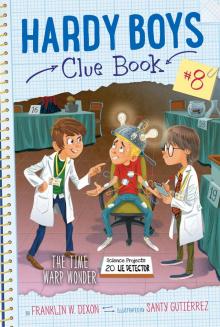 The Time Warp Wonder
The Time Warp Wonder Ghost Stories
Ghost Stories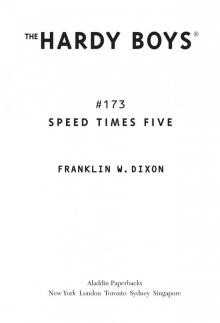 Speed Times Five
Speed Times Five What Happened at Midnight
What Happened at Midnight Three-Ring Terror
Three-Ring Terror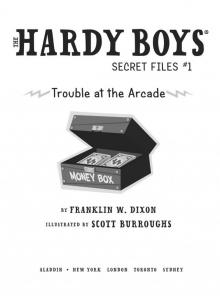 Trouble at the Arcade
Trouble at the Arcade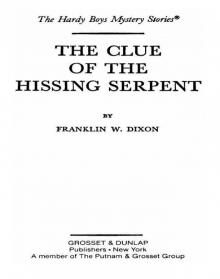 The Clue of the Hissing Serpent
The Clue of the Hissing Serpent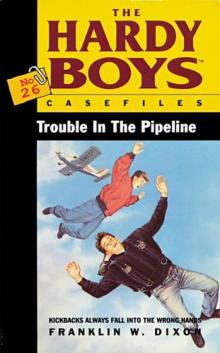 Trouble in the Pipeline
Trouble in the Pipeline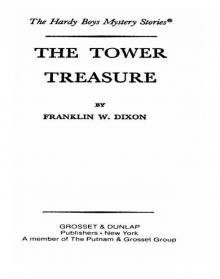 The Tower Treasure
The Tower Treasure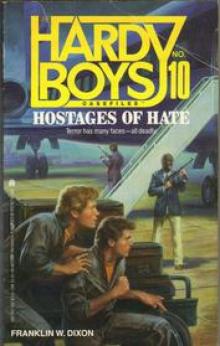 Hostages of Hate
Hostages of Hate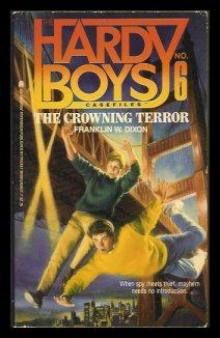 The Crowning Terror
The Crowning Terror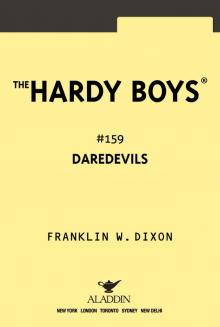 Daredevils
Daredevils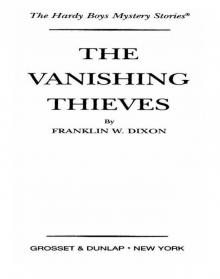 The Vanishing Thieves
The Vanishing Thieves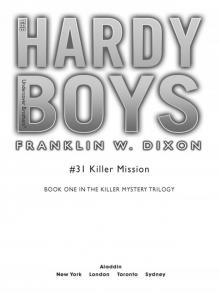 Killer Mission
Killer Mission The Mark of the Blue Tattoo
The Mark of the Blue Tattoo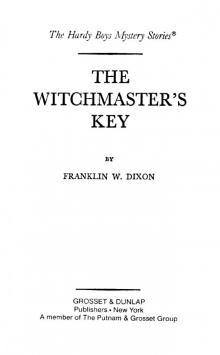 The Witchmaster's Key
The Witchmaster's Key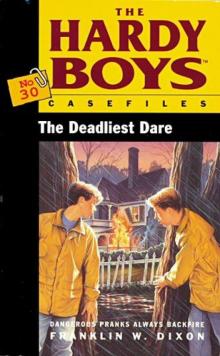 The Deadliest Dare
The Deadliest Dare Peril at Granite Peak
Peril at Granite Peak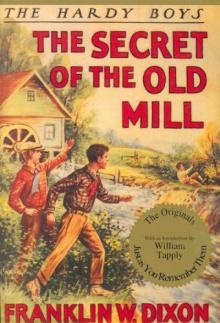 The Secret Of The Old Mill thb-3
The Secret Of The Old Mill thb-3 Rocky Road
Rocky Road The Demolition Mission
The Demolition Mission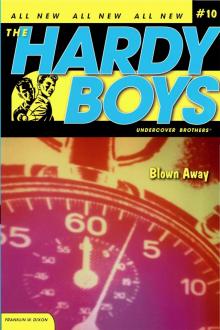 Blown Away
Blown Away Passport to Danger
Passport to Danger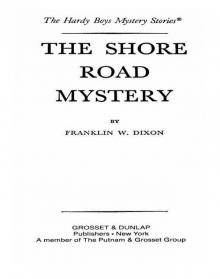 The Shore Road Mystery
The Shore Road Mystery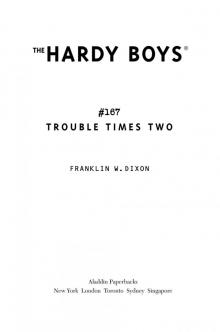 Trouble Times Two
Trouble Times Two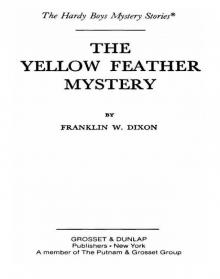 The Yellow Feather Mystery
The Yellow Feather Mystery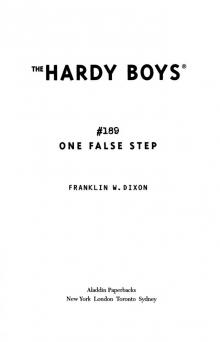 One False Step
One False Step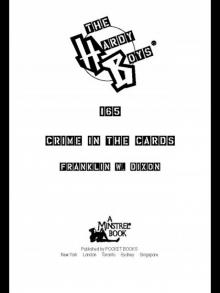 Crime in the Cards
Crime in the Cards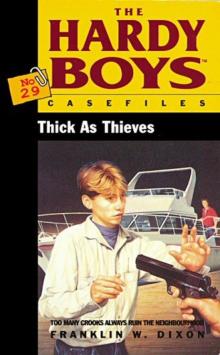 Thick as Thieves
Thick as Thieves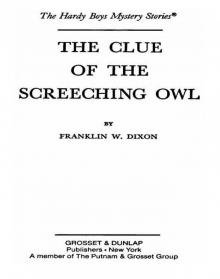 The Clue of the Screeching Owl
The Clue of the Screeching Owl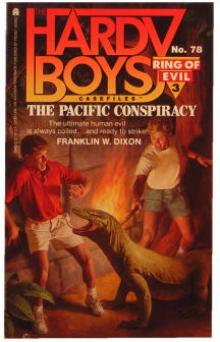 The Pacific Conspiracy
The Pacific Conspiracy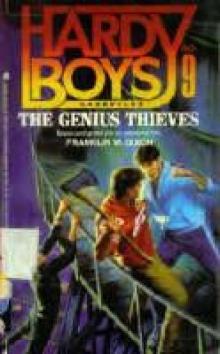 The Genius Thieves
The Genius Thieves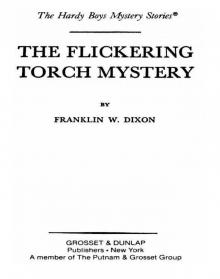 The Flickering Torch Mystery
The Flickering Torch Mystery Into Thin Air
Into Thin Air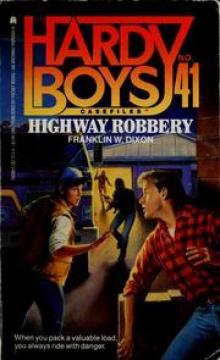 Highway Robbery
Highway Robbery Deadfall
Deadfall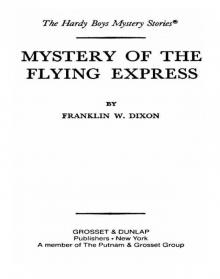 Mystery of the Flying Express
Mystery of the Flying Express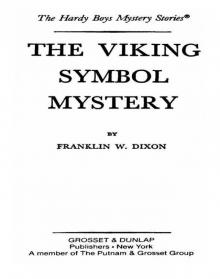 The Viking Symbol Mystery
The Viking Symbol Mystery The End of the Trail
The End of the Trail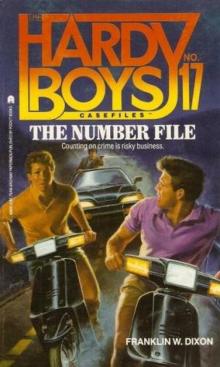 The Number File
The Number File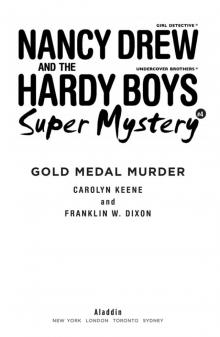 Gold Medal Murder
Gold Medal Murder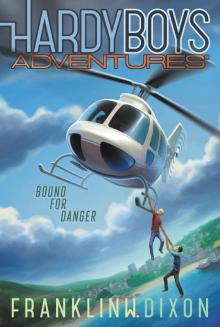 Bound for Danger
Bound for Danger Collision Course
Collision Course The Madman of Black Bear Mountain
The Madman of Black Bear Mountain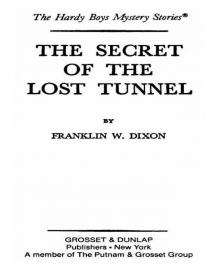 The Secret of the Lost Tunnel
The Secret of the Lost Tunnel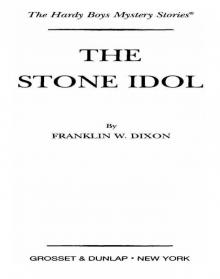 The Stone Idol
The Stone Idol The Secret of Pirates' Hill
The Secret of Pirates' Hill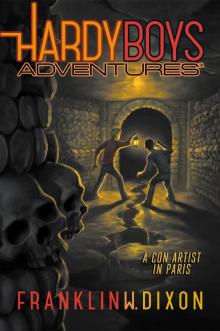 A Con Artist in Paris
A Con Artist in Paris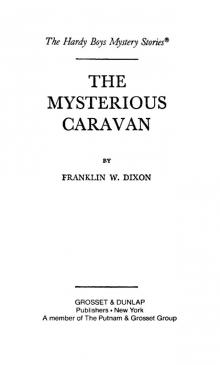 The Mysterious Caravan
The Mysterious Caravan The Secret of Sigma Seven
The Secret of Sigma Seven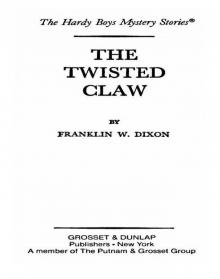 The Twisted Claw
The Twisted Claw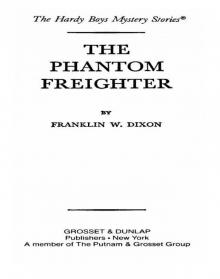 The Phantom Freighter
The Phantom Freighter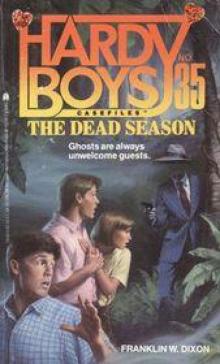 The Dead Season
The Dead Season The Video Game Bandit
The Video Game Bandit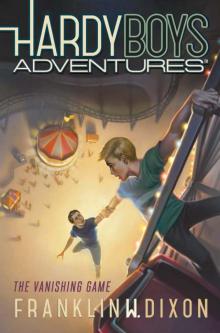 The Vanishing Game
The Vanishing Game Typhoon Island
Typhoon Island